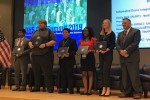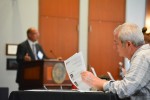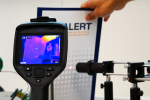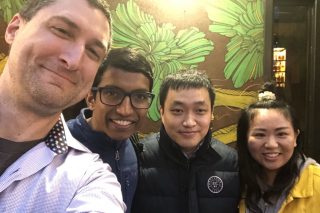News & Events
Student Central
From PhD Candidates to Professionals, ALERT Trio Continues to Collaborate February 22, 2021

Ziyan Wu, Srikrishna Karanam, and Meng Zheng understand the importance of collaboration. The trio of research scientists currently comprise a small, but effective, team at United Imaging Intelligence (Cambridge, MA); however, their professional journey together began as ALERT student researchers many years earlier.
Under the guidance of ALERT researcher and Rensselaer Polytechnic Institute (RPI) professor, Richard Radke, the three completed their doctoral programs at RPI—both Wu and Karanam completed their Ph.D. studies in Computer and Systems Engineering in 2014 and 2017, respectively, and Zheng completed her Ph.D. study in Electrical Engineering in 2020.
Furthering transformational research and next-generation technologies to address explosives-related threats is central to ALERT’s mission, as is demonstrating meaningful impact through its education program, which is focused on developing a highly skilled workforce for the homeland security enterprise. ALERT’s education program has introduced and guided hundreds of student researchers and career professionals into the workforces of the Department of Homeland Security (DHS) and its stakeholders.
During their academic careers, Wu, Karanam, and Zheng worked closely with Radke, contributing to ALERT’s Human Detection Re-Identification for Mass Transit Environments research project, as well as the task order: Video Analytic Surveillance Transition (VAST), which involved the installation of a testbed in the Cleveland Hopkins International Airport (CLE). Following these two successful projects, they worked on the initial phase of Correlation of Luggage and Specific Passengers (CLASP), which leverages a realistic mock airport security checkpoint built in ALERT’s Video Analytics Laboratory at the Kostas Research Institute (KRI) for Homeland Security.
“The work I did for ALERT was important to my development as a researcher, because it was connected to a challenging real-world problem with critical security outcomes. For example, if the system misses one person going the wrong way in a security checkpoint, then this presents a serious security risk to the entire airport. Because of this, I learned to pay extra attention to algorithm and system design to ensure that there were no loopholes, which helped me develop good habits as a researcher,” said Wu.
“Instead of focusing on the performance of one fancy algorithm and whether it was meeting our performance goal on a particular benchmark dataset, we had to take a much more comprehensive viewpoint and consider how it would perform and serve stakeholders in a real-world scenario.”
[YouTube Video: “Real-Time Airport Security Checkpoint Surveillance Using a Camera Network”]
In partnership with other ALERT researchers at Boston University and Northeastern University, and working closely with industry experts at Siemens, Radke’s research team was instrumental in developing the infrastructure for these testbeds—setting up camera networks and data recording devices, building software architecture, and developing algorithms to track passengers as they moved through the airport security checkpoint. According to Karanam, the real-world experience of collaborating with industry and Transportation Security Administration (TSA) professionals was beneficial to their careers.
“The typical Ph.D. student is concerned with publishing papers and graduating ASAP. In our situation, we were motivated by a real-world problem, and we had to work with real-world customers, both of which formed the basis of our unique PhD experiences. We learned how to map out customer needs and requirements, translate them to specific research problems, build algorithms and technical solutions to address the problems, and then manage expectations and communicate results properly with customers, who might not be experts in our technical area—in this case, computer vision,” said Karanam.
“When I was interviewing for jobs, I could sense that the people on the other side of the table were very surprised to hear that I had worked and communicated directly with customers as a Ph.D. student—it was very advantageous.”
After Wu completed his Ph.D. in 2014, he was hired at Siemens. Following in his footsteps, Karanam completed an internship under Wu, and was also hired at Siemens post-graduation. When the two moved on to United Imaging Institute, they brought Zheng on as an intern, who joined the team officially upon completing her Ph.D. in 2020.
Zheng attributes her problem-solving skills, which serve her well in her current professional role, to her time as an ALERT student researcher: “It provided me with the opportunity to apply the theoretical to real-world problems, such as checkpoint security, and that really helped me develop strong problem-solving techniques. I don’t think most Ph.D. candidates have that opportunity. This was the most valuable part of the experience for me.”
Radke looks back on the careers of his three students with pride:
“One of the best parts of being a professor is seeing your students grow and become independent researchers. Ziyan, Srikrishna, and Meng were three of my best, and it has been deeply satisfying to watch them mentor each other and collaborate over the course of more than 10 years. Ziyan and I originally came up with the idea of simulating a security checkpoint on the RPI campus in 2010; Srikrishna helped design the CLASP testbed when it was just an empty room in 2016; Meng’s algorithms were some of the first we applied to the feeds from CLASP when it was up and running in 2017. Along the way, they published a ton of jointly authored papers, released several benchmark datasets and code libraries to help the community, and have gotten many computer vision algorithms developed in the lab to work robustly in real-world operational environments.”
The trio, which now spend their days developing computer vision algorithms for medical applications, acknowledge it is a bit unusual to continue working so closely together post-graduation, but they were inspired by their Ph.D. advisor and his outlook on collegiality.
“Professor Radke actively encouraged graduating students to continue collaborating with current students—this motivated the three of us to continue collaborating and it is a large part of why we still work together today,” said Karanam
Meet the ALERT Students April 30, 2020
For users without YouTube access: Meet the ALERT Students
Watch our latest video, Meet the ALERT Students! Hear from Annette Colón Mercado (Project R3-C), Muhammad Usman Ghani (Project R4-C1), and Meng Zheng (Project R4-A3) as they discuss their projects and the importance of ALERT research while participating in the ALERT Industrial Advisory Board Meeting last fall.
The annual Industrial Advisory Board (IAB) Meeting provides students with opportunities to present their work during the student poster session, which allows for networking with industrial members as well as local, state, and federal government representatives. Annette has participated in the IAB meeting for two years and she believes that ALERT research is important to her because, “We are working to make our nation a safer and a more secure place by doing the research we do and by implementing these detection systems for DHS current problems.”
ALERT students are engaged in many events designed to highlight their research accomplishments including the Annual Student Pipeline Industry Roundtable Event (ASPIRE) and the ALERT Technology Showcase.
ASPIRE is held annually each spring at Northeastern University in Boston to support students looking for internships, co-op opportunities and full-time jobs. Students have the opportunity to connect with industrial and government partners through one-on-one meetings to discuss their research, practice “elevator pitches” and discuss employment opportunities
ALERT’s Technology Showcase focuses on the transition of ALERT’s work through presentations, posters, and technology demonstrations of the Center’s research and tools. Students from each project are invited to present their project during the poster session which allows them to connect with faculty, industrial partners, and government representatives throughout the Showcase.
For more information on ALERT projects, please visit the following link: https://alert.northeastern.edu/research/
ALERT Students Present Research during Virtual RISE: 2020 April 30, 2020

On April 9th, Northeastern University held the 10th annual Research, Innovation and Scholarship Expo (RISE) 2020 via virtual conference. The expo, traditionally held in person, provides an opportunity for students and faculty members to showcase scholarly research and fundamental discoveries that can be translated into real-world applications. This year, three ALERT students, presented projects to RISE judges and the general public.
Current ALERT students, Mahshid Asri and Elizabeth Wig, presented research work related to a task order contract known as Maturation and Validation of Dielectric Characterization Algorithms. Mahshid and Elizabeth’s presentations focused on reducing pat-down rates at airport checkpoints by using automatic algorithms that can distinguish potentially hazardous foreign objects from the benign ones on the human body, like belts or wallets. Both student presentations were very well received by attendees. Past ALERT Science and Engineering Workforce Development Program (SEWDP) student, Joseph Robinson’s research presentation focused on addressing issues with facial recognition and face tracking within image and video data. He presented research proposing “an adversarial training framework that leverages unlabeled data to improve model performance.”
Presentation posters can be viewed online by clicking one of the links below.
- Mahshid Asri – Automatic Characterization of Body-Borne Threats Using Wideband Radar
- Elizabeth Wig – Wideband Analysis of Imaging of Dielectric-Covered Curved Surfaces for Millimeter-Wave Security Scanning
- Joseph Robinson – Laplace Landmark Localization: A Practical Face Tracker
We congratulate our students on their well-received presentations at Virtual RISE: 2020. We are truly impressed with the agility and resilience of the students and staff during this unprecedented time. In a short period, students, staff and faculty worked quickly to adjust this year’s event to a virtual experience, ensuring the programming and awards stayed on schedule. To learn more about the RISE program, visit https://www.northeastern.edu/rise/.
The Virtual Hackathon to Combat Human Trafficking will take place March 28th and 29th! March 23, 2020
Our fellow Center of Excellence, the Criminal Investigations and Network Analysis (CINA) Center, Blue Compass, and the TraCCC Center at George Mason University are hosting a virtual hackathon to combat child sexual exploitation and labor trafficking. For more information on the event and how to register, please visit their event page here.
ALERT Student Emily Belk featured in podcast, “Thinking Through Autonomy” January 3, 2020

The Department of Homeland Security (DHS) Centers of Excellence (COE) Summit Grand Challenge Student Competition was held on July 31, 2019 at George Mason University in Arlington, Virginia. ALERT Student Emily Belk of Northeastern University and her team won first place with their proposal entitled, “Automated Drone Integrated Information System (ADIIS).” In October 2019, she was invited to participate in Ken Dunlap’s podcast, “Thinking Through Autonomy”, along with other students and mentors to discuss their research and experiences at the Grand Challenge Student Competition. Others featured in the podcast included COE representatives who advised the student participants and served on the COE Summit Grand Challenge Committee – Beth Austin-DeFares from the Maritime Security COE at Stevens Institute of Technology, Stu Mackenzie from the Criminal Investigations and Network Analysis COE at George Mason University, and Andrea Whitesell from the Critical Infrastructure Resilience Institute COE at the University of Illinois at Urbana– Champaign, as well as, Will Case, a student from Johnson C. Smith University who was a member of the second place winning team.
Hear about Emily’s experiences during the Grand Challenge and her work with ALERT on the podcast, “Thinking Through Autonomy”.
Save the Date for CBP ADEPT03! December 18, 2019

Please note: CBP-ADEPT-03 was originally scheduled to take place July 8-9 but has been postponed and the dates are TBA.
The third workshop on Advanced Developments Encompassing Processes and Technologies for Customs and Border Protection (CBP-ADEPT-03) will be held July 8-9, 2020, at Northeastern University in Boston. The workshop will address Creating Effective Engagements with CBP.
This workshop is a spinoff of the ADSA workshops that have been held to address aviation security. The Department of Homeland Security, Customs and Border Protection (DHS-CBP) has funded a new series of workshops dedicated to CBP. The format of the workshop is designed to encourage discussion during presentations. We look forward to seeing everyone in July – more details to follow soon.
More information on CBP-ADEPT-03 can be found here: https://alert.northeastern.edu/transitioning-technology/cbpadept/cbp-adept-03/
Learn more about past ADEPT events here. https://alert.northeastern.edu/transitioning-technology/cbpadept/
Annual Student Pipeline Industry Roundtable Event (ASPIRE) 2020 December 18, 2019
The Annual Student Pipeline Industry Roundtable Event (ASPIRE) will be held on April 8th, 2020 from 11:30AM-5:00PM at the Cabral Center, John D. O’Bryant African American Institute on the Northeastern University, Boston Campus. The event is hosted by the ALERT (Awareness and Localization of Explosives-Related Threats) & Gordon-CenSSIS (The Bernard M. Gordon Center for Subsurface Sensing and Imaging Systems).
ASPIRE provides an optimum setting for dialogue among members of the academic, industrial and government communities and also provides networking opportunities for ALERT students looking for internships, co-op opportunities and full-time jobs. The event is targeted at undergraduate and graduate students in the fields of engineering, science, and computer & information sciences interested in careers related to homeland security.
The ASPIRE features representatives from our Gordon-CenSSIS and ALERT industry and government partners. Typical event partners expected are American Science & Engineering, Department of Homeland Security Science and Technology, Raytheon Company, U.S Customs and Border Protection and More.
Registration
If you are a student interested in attending, please reach out to Tiffany Lam: [email protected].
If you are an industry or government representative interested in attending, please reach out to Emel Bulat: [email protected].
ALERT Technology Showcase: Inspiring Innovation October 31, 2019

For users without YouTube access: ALERT Technology Showcase: Inspiring Innovation
This past May, the ALERT Center of Excellence held its first Technology Showcase at Northeastern University. The showcase featured presentations, posters, and technology demonstrations of the Center’s research and tools, highlighting ALERT’s partnerships with industry and government.
In our latest ALERT video, ALERT Technology Showcase: Inspiring Innovation, attendees discuss the importance of bringing researchers from various backgrounds together to share their work and receive diverse viewpoints on their technical approach. Highlighting how this type of a showcase is rare, Astrophysics, Inc. CEO, François Zayek thought it was a great way to encourage researchers to step back from their interests and learn about new technology.
Not only did researchers like ALERT Video Analytics and Signature Analysis Lead, David Castañón, find sharing their work and innovative technologies amongst peers helpful, they also found the exposure to industry and government stakeholders provided a different, yet significant perspective.
“Companies get to see you, and they’re not always available while you’re doing research at a University. It’s good to get feedback from people from different viewpoints in the company and the government. They say, ‘well this is interesting,’ and this may be useful in a context that I hadn’t thought of.”
– David Castañón, ALERT Video Analytics and Signature Analysis Lead and Professor of Electrical and Computer Engineering at Boston University.
Hear more from Professor Castañón and Astrophysics, Inc. CEO François Zayek in “ALERT Technology Showcase: Inspiring Innovation.”
REMINDER: ADSA21 November 5th & 6th October 31, 2019
We look forward to seeing you next week at ADSA21!
The twenty-first Advanced Development for Security Applications (ADSA21) Workshop will be held on November 5-6, 2019 at Northeastern University in Boston, MA. The theme of the workshop is “Effective Integrated Systems.” Presentations and panel discussions will include defining and developing effective integrated systems including human operators, detection versus deterrence versus displacement, and the role of interconnectivity with open architectures, amongst others.
These workshops are by invitation only. Please contact Tiffany Lam at [email protected] if you are interested in attending future ADSA events.
FAA Challenge – Smart Airport Student Competition October 31, 2019

The Federal Aviation Administration is hosting a Smart Airport Student Competition for undergraduate and graduate students to “develop innovative ways to use smart technology in and around airports to enhance the overall travel experience.” The competition will recognize students with the ability to demonstrate innovative thinking focused on improving the efficiency and effectiveness of smart technology in and around the airport environment while enhancing the overall traveling experience.
The FAA hopes to stimulate and advance innovation in aviation research, promote the development of a robust aviation workforce to support a growing and evolving aerospace system, develop a pipeline to fill current and projected shortages via partnerships with academia and industry, and drive a passion for aviation in today’s youth of all ages and backgrounds. Moreover, the FAA intends to incentivize university-level students at accredited US-based colleges and universities to think creatively to develop solutions to transportation technology challenges while addressing the human factors aspects of the traveler experience. and to share those innovations with the broader community.
The competition started on September 16, 2019, and ends on January 13, 2020. Visit the FAA Challenge website for more information on the submission guidelines.

